Sadiq Khan: 'I never wanted to be a culture war poster boy'
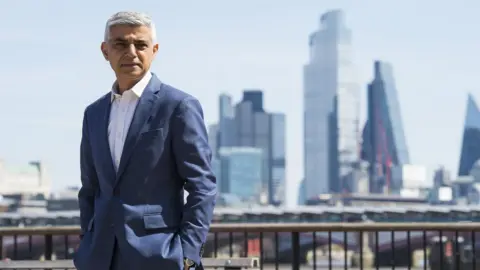 PA Media
PA MediaIn five years as the mayor of the UK's largest city, Sadiq Khan has overseen the most challenging period in London for more than in half a century.
A pandemic, a recession and even a fight with the president of the USA - but how has it changed him?
- This article is part of a series of profiles on the candidates from the four largest parties running for mayor of London.
After a tumultuous campaign, Mr Khan became mayor in 2016, and the politician with the largest personal mandate in the UK.
The new platform thrust the former MP and shadow cabinet minister into the national spotlight, but even before Mr Khan had started his new job, it was apparent his religion would make him a target.
Paul Golding, the candidate for the far-right Britain First party, turned his back on the mayor as he made his victory speech.
"I realise that because of who I am - my identity and my religion, my ethnicity and what I stand for - many see me as a poster boy for a culture war," Mr Khan said.
Since 2016, the mayor has acted as a lightning rod for right-wing attacks, most notably when he fell out with then US President Donald Trump.
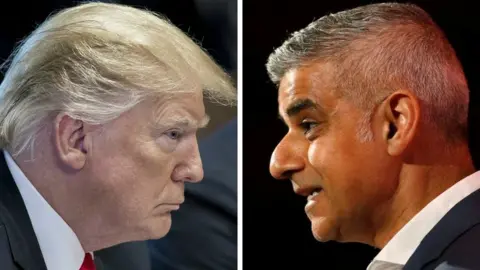 EPA / Reuters
EPA / ReutersFollowing Mr Trump's 2017 travel ban on Muslim majority countries, the pair exchanged a war of words - and balloons.
The feud culminated in a large inflatable of Mr Khan wearing a bikini being paraded through London at a pro-Trump rally in September 2019.
It was a direct response to a balloon of Mr Trump dressed as a baby, which Mr Khan approved for use at a protest three months earlier.
The spat lifted Mr Khan's profile, leading to interviews in the US and global media.
"Neither Boris Johnson nor Ken Livingstone had the global profile around the world, or the love or hate I experienced," Mr Khan said.
"I'm not interested in a culture war or any wars. That's not the job I applied for. That's not what I stood for."
He said the election of Mr Trump and the Brexit campaign had "normalised a sense of hatred that I've not seen in my lifetime", adding: "That brought into the mainstream a whole bunch of stuff that was on the periphery for decades."
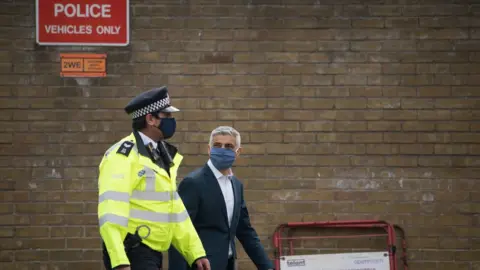 PA Media
PA MediaRaised in a council house in south London, the 50-year-old Mr Khan admits he is not one to shy away from a fight.
He scrapped his way to the top job in London, felling Labour and Conservative heavyweights along the way.
"I think Londoners expect their mayor to be the champion of their city," Mr Khan said.
"And that means sometimes taking on the prime minister and, in my view, having to take on the president of the USA."
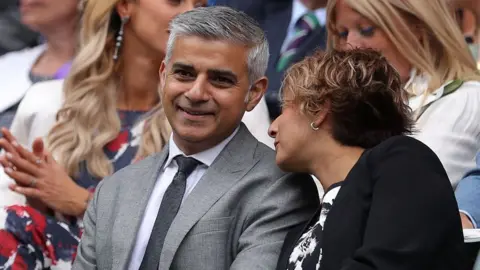 AFP
AFPAfter a period of resisting full-time police protection, he relented in 2017 "for a variety of reasons", including increased death threats, but said the move ended "all spontaneity" in his life.
The following year, the Finsbury Park Mosque terrorist Darren Osborne said that killing Mr Khan would have been "like winning the lottery".
Mr Khan is quick to point out that he loves his job, but nothing prepared him or his family for the impact it would have on them.
"Simple things like going for a walk, or going to a restaurant, or going to the cinema, are very different now," he said.
"You've got to plan things in advance. The police have to see where you're going for advanced reconnaissance.
"I have no real private life any more, it's all in the public eye."
His two daughters especially "found it challenging as teenage kids going to university".
London's 'most difficult year'
When the Covid pandemic hit, London was at the epicentre of England's first wave.
To date, about 19,000 Londoners have died, while at least 720,000 have been infected with the virus.
More than 300,000 people have found themselves out of a job as the capital's economy, normally the powerhouse of the UK, shrank alarmingly.
"It's been the most difficult year I think our city has had for more than 70 years," Mr Khan said.
"But it has been amazing to see so many Londoners - key workers from the NHS, to transport, to police and those that work in shops - come to the fore and rise to the occasion."
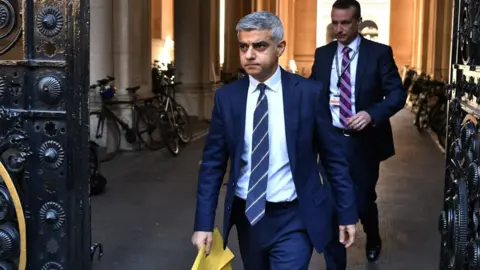 Getty Images
Getty ImagesThe pandemic has also exposed rifts between central government and regional mayors.
After receiving £4bn in emergency funding to keep Transport for London (TfL) solvent, its finances became a battlefield between Mr Khan and the government.
Prime Minister Boris Johnson claimed Mr Khan "effectively bankrupted" TfL even before the coronavirus crisis.
Mr Khan dismissed these claims as "lies", saying TfL's deficit had been reduced by "more than 71% before the pandemic" on his watch.
Perhaps unsurprisingly, he argues the pandemic has shown the need for more power to be devolved from central government.

LONDON'S ELECTION: THE BASICS
What's happening: On 6 May, people will vote to elect a mayor and 25 members of the London Assembly. Together they form the Greater London Authority, which governs the capital.
Why does it matter? The mayor has a £19bn budget, is responsible for transport and policing and has a role in housing, planning and the environment. The London Assembly holds the mayor to account. Find out more here.
Who is standing? There are 20 candidates running for London mayor and a full list can be found here.

Mr Khan said: "I think had the government trusted the mayors across the country to deal with the pandemic, I think the damage to people's life and health and economy would be less severe."
Mayors, he argues, are able to react more quickly to local issues, are more accountable and more efficient than central government.
This chimes with the findings of the 2017 report of the London Finance Committee, a body first set up by Mr Johnson in his time as London mayor.
As Mr Khan put it: "One of the lessons from Brexit is people want to take control back.
"But control shouldn't be hoarded in Downing Street, it should be dispersed across the country."
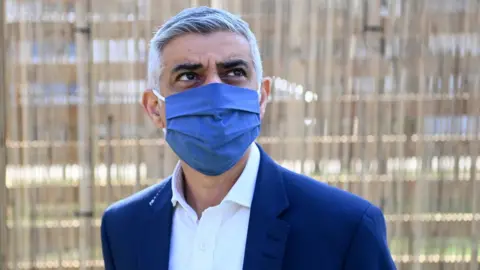 EPA
EPAA self-described workaholic, Mr Khan says his experiences as mayor have taught him to delegate.
"You've got to prioritise. You can't do everything, even with the best will in the world and working seven days a week.
"You must surround yourself with excellent people.
"That doesn't mean yes men. You want people to challenge you at all times."
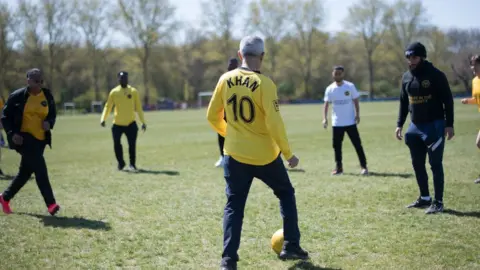 PA Media
PA MediaIt is clear Mr Khan still relishes the fight.
He is, after all, running to do the job again - and he plans to keep on running, with a plan to stand again at the next mayoral election in 2024.
"As far as I'm concerned, being the mayor of London is the best job in politics," he said.
"I can't see a reason not to carry on as long as Londoners want me to do so."
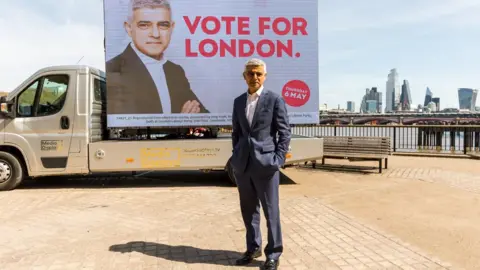 EPA
EPASo for now, at least, he has no intention of heading back to Parliament like his predecessor Mr Johnson.
He said: "The prize I'm looking at is to get enough Londoners to lend me their vote again so I can be mayor for a second term.
"Labour hasn't won a second term since 2001. We tend to not win second elections."
This election, Mr Khan says, will also test whether online attacks against him are backed up by anything real or "whether it's just bots or sad people living in their parents' basements".
"We'll have to wait and see on 6 May," he added.
"That will tell us whether those that shout the loudest on social media are real people with real followings, or something else."
